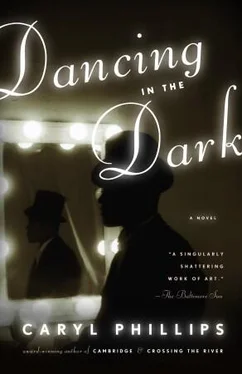MOSTLY ABOUT PEOPLE , LONDON, 1903
And then they tour England. Dark-skinned missionaries in the heartland of Britain moving diligently between Hull, Peckham, Newcastle, Sheffield, and Manchester. Bert especially enjoys Oxford, the center of books and learning, and once they leave this ancient city the company travels north and eventually crosses the invisible border into Scotland, where they offer In Dahomey to a new race of people. In Edinburgh, the capital of this new king dom, Bert is taken in by a secret group of men who wish to honor him. He becomes a mason, a colored man in Waverly Lodge No.597 of Edinburgh, Scotland, and by degrees he enters further into a foreign world of respectable connections. It transpires that it is his offstage clerical dignity that has also impressed these fellows, for they recognize in Bert the type of man in whose shadow people might seek shade and protection. But this is not to say that they don’t appreciate his darky antics. He has made them all laugh with his droll singing and his loose-limbed dancing, but the shrewd Scots suspect that behind Mr. Williams’s broad grinning mouth something mournful is stirring for their new American brother performs as though he derives little joy from his tomfoolery.
When the assembled Scottish pressmen ask an exasperated George to demonstrate the cakewalk to them, he smiles weakly then climbs to his aching feet, noisily pushes back a few chairs, and begins with a sporty strut.
Bow to the right
Bow to the left
Then you take your place
Be sure to have a smile on your face
Step high with lots of style and grace
With a salty prance
Do a ragtime dance
Step way back and get your gun
With a bow look wise
Make goo-goo eyes
For that’s how the cakewalk’s done.
George cocks an eyebrow to make himself appear more rakish, but he can no longer maintain the pretense. This buttery exchange, lubricated with flattery on both sides, is turning his stomach. Williams and Walker have made their coin and he is now eager that they should return home as hastily as possible.
As the ship moves slowly in the direction of the United States, Bert stands on deck with his partner. He turns to George, and silently revisits the same questions that have plagued him through many lonely evenings in the foggy country that they are now leaving behind. Is the colored performer to be forever condemned to pleasing a white audience with farce, and then attempting to conquer these same people with music and dance? Is the colored American performer to be nothing more than an exuberant, childish fool named Aunt Jemima, Uncle Rufus, or simply Plantation Darky, who must be neither unique nor individual? Can the colored American ever be free to entertain beyond the evidence of his dark skin? Can the colored man be himself in twentieth-century America? He remembers long nights drinking good whiskey and worrying about these matters in Jimmie Marshall’s hotel with his partner, and Bob Cole and Ernest Hogan, and he recalls an increasingly petulant George talking loudly about his determination to kill the chicken-stealing, crapshooting, razor-toting, gin-guzzling, no-good nigger in white people’s heads. Bert stands on deck and continues to look at his partner, but sadly he understands what George thinks about him. His comic timing, his wide range of facial expressions, his much-admired technical skills — he knows that his partner respects these well-honed talents, but he also knows that his partner longs to say, “Bert, you look and act like a nigger and we colored Americans no longer recognize you for we are trying to move on.” But George says nothing, and George has never said anything directly, and Bert turns away from his friend and narrows his eyes as the sea breeze begins to gather strength. In the distance he can see faintly visible steamers trailing dissolving smoke as they hug the line of the horizon and inch slowly in the direction of America. Bert pulls a pack of cigarettes from the inside pocket of his jacket, and then he cups his hand and strikes a match, which immediately sputters out. He understands how George feels about his blackface performance, but until his partner finds words that neither admonish nor accuse, then an uneasy discord will exist between them. Bert finally lights his cigarette and then he tosses the match overboard. He stares plaintively at the sea, but he feels the weight of George’s critical eyes and understands that his carefully calibrated blackface act is now beginning to corrode their partnership.
It was in Scotland that Bert was finally able to discover more about this elusive man Ogilby, whose book he loved to study. He learned that John Ogilby was born outside of Dundee in 1600, the son of a well-heeled Scottish gentleman. He published his Africa in 1670, a volume that — Bert had always felt convinced— should he study it sufficiently, would eventually provide him with the evidence that every Pullman porter was descended from a king. It was this leather-bound tome that he utilized for proof that Africa was a continent of history and tradition, and not one of rude chaos; and the act of entering this book always enabled Bert to experience the temporary peace of being able to moor himself in some other place.
AFRICA: / BEING AN / ACCURATE DESCRIPTION / OF THE / REGIONS / OF / Egypt, Barbary, Lybia, and Billedulgerid, / The LAND of / Negroes, Guinee, AEthiopia, and the Abyssines, / With all the Adjacent Islands, either in the Mediterranean, / Atlantick, Southern, or Oriental Sea, belonging there unto. / With the several Denominations of their / Coasts, Harbors, Creeks, Rivers, Lakes, Cities, / Towns, Castles, and Villages. / THEIR / Customs, Modes, and Manners, Languages, / Religions and Inexhaustible Treasure; / With their / Governments and Policy, variety of Trade and Barter, / And also of their / Wonderful Plants, Beasts, Birds, and Serpents. / _____ / Collected and Translated from most Authentick Authors, / And Augmented with later Observations; / Illustrated with Notes, and Adorn’d with peculiar Maps, and proper Sculptures, / By JOHN OGILBY Esq; / Master of His Majesties REVELS in the Kingdom of IRELAND. / _____ / LONDON, / Printed by Tho. Johnson for the Author, and are to be had at his / House in White Fryers, M.DC.LXX.
I’D LIKE TO BE A REAL LADY
Introduced by Ada Overton Walker in Williams
and Walker’s latest production, In Dahomey
Ada walks with him on deck and again she asks him about Eva, although she never mentions the woman by name. His wife is angry and distressed, and sometimes her behavior frightens him. George stares out toward the distant point where the rough mating of sea and sky fuses at the horizon, and he carefully prepares yet another story as a substitute for the truth for he cannot tell his wife that in his soul he is sailing back across the broad expanse of the Atlantic Ocean toward Eva, who, one night after the show, approached him in his high-scented dressing room at the New York Theatre. A half hour later, Eva unlocked the door and stepped back out into the corridor knowing full well what the rest of the company were thinking. Eva does not care, and George likes this about her, but Ada does care, for this is not just another of her husband’s anonymous women, this is Eva Tanguay, and Ada believes that her full-lipped, ebony-hued husband has no place with a flame-haired, hip-swinging white maiden. Ada cares, and at least to begin with she said nothing, but when she eventually asked her husband to deny the rumors he lied to her face, and she knew that he was lying. And now again, on this ship, Ada asks him about Eva Tanguay and George notices that his wife has a crazy glint in her coal black eyes and so he kisses her delicately on the cheek and then ushers her from the deck of the ship and in the direction of their cabin, where he will gently cradle her small breasts as though they were newborn twins for he knows that his Ada is partial to such attention.
Читать дальше












